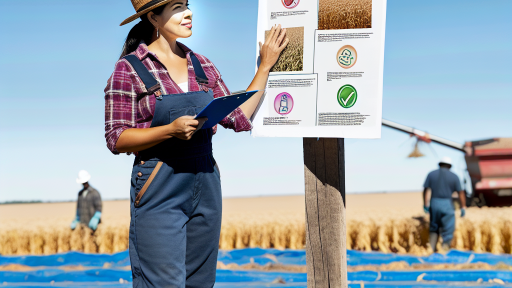Introduction to Rural Development Policies and Their Importance
Rural development policies play a crucial role in enhancing farm sustainability.
These policies provide a framework for improving agricultural practices.
Additionally, they address economic, social, and environmental issues.
By focusing on rural areas, these policies help empower local communities.
They promote inclusive growth and equitable resource distribution.
Objectives of Rural Development Policies
The primary objective is to enhance the living standards of rural populations.
Policies aim to improve access to essential services like education and healthcare.
Moreover, they seek to create employment opportunities within rural sectors.
These initiatives foster skill development among farmers and community members.
Impact on Agricultural Practices
Rural development policies influence sustainable agricultural practices significantly.
They promote environmentally friendly farming methods that conserve resources.
For instance, policies encourage crop rotation and organic farming techniques.
These approaches boost soil health and increase biodiversity.
Furthermore, sustainable practices reduce dependency on chemical inputs.
Support for Smallholder Farmers
Policies often focus on supporting smallholder farmers, which is essential.
Transform Your Agribusiness
Unlock your farm's potential with expert advice tailored to your needs. Get actionable steps that drive real results.
Get StartedThese farmers face unique challenges, including limited resources and access to markets.
Rural development initiatives provide financial aid and resources to these farmers.
Support includes microloans and access to training programs.
Such assistance enhances their productivity and income potential.
The Role of Stakeholders
Various stakeholders contribute to the successful implementation of rural development policies.
Government bodies, non-governmental organizations, and community groups collaborate for this purpose.
They work together to identify needs and develop effective strategies.
This collaboration ensures that policies are relevant and impactful.
Challenges in Implementation
Despite the benefits, challenges persist in implementing rural development policies.
Lack of funding remains a significant barrier to program success.
Additionally, inadequate infrastructure hinders access to markets and services.
Further, policy fragmentation can lead to inconsistent efforts across regions.
Future Directions
Looking ahead, rural development policies must adapt to changing conditions.
Climate change poses new risks to agricultural sustainability.
Overall, policies should incorporate climate resilience measures.
Collaborative efforts will also be vital for addressing emerging agricultural challenges.
Thus, ongoing evaluation and adjustment of policies are crucial for future success.
Understanding Farm Sustainability
Defining Farm Sustainability
Farm sustainability refers to practices that ensure long-term agricultural productivity.
It encompasses various dimensions, including environmental, economic, and social aspects.
Moreover, it emphasizes the importance of resource conservation.
By focusing on sustainability, farmers can enhance ecosystem health.
Key Dimensions of Sustainability
Environmental sustainability is vital for maintaining soil and water quality.
This dimension supports biodiversity and reduces pollution.
Economic sustainability ensures that farming remains profitable over time.
Showcase Your Farming Business
Publish your professional farming services profile on our blog for a one-time fee of $200 and reach a dedicated audience of farmers and agribusiness owners.
Publish Your ProfileFarmers must balance costs with revenues to thrive financially.
Social sustainability focuses on the well-being of farming communities.
It aims to improve livelihoods and support rural development initiatives.
The Importance of Sustainable Practices
Adopting sustainable practices enhances farm resilience to climate change.
It prepares farms to withstand droughts and floods.
Additionally, sustainable farming meets consumer demand for eco-friendly products.
This trend leads to a competitive edge in the market.
Furthermore, sustainable practices promote healthier food systems.
Ultimately, they protect natural resources for future generations.
Historical Context
Evolution of Rural Development Policies
Rural development policies have a long and varied history.
Initially, these policies emerged in response to agricultural challenges.
As population growth accelerated, food security became a pressing issue.
Governments recognized the need for systematic intervention.
In the mid-20th century, policies focused on modernization and mechanization.
These changes transformed farming practices across many countries.
Impact on Agriculture
Rural development policies significantly impacted agricultural productivity.
They enhanced access to technology and innovation for farmers.
Moreover, financial support programs improved farmers’ livelihoods.
State and federal grants helped implement these initiatives.
Consequently, farm incomes began to rise, reducing poverty levels.
Integration of Sustainability
In recent decades, sustainability emerged as a crucial focus of these policies.
Governments began prioritizing environmentally friendly practices.
This shift aligned with global concerns about climate change.
As a result, policies now encourage sustainable land management techniques.
These methods also foster biodiversity and soil health.
Modern Policy Frameworks
Contemporary rural development frameworks incorporate diverse stakeholders.
Farmers, non-profit organizations, and government agencies collaborate closely.
This approach ensures that local needs and knowledge drive policy design.
Furthermore, policies now emphasize resilience in rural communities.
This integration of community input enhances policy effectiveness.
Explore Further: Adapting Farming Practices to Rural Development Policy Changes
Key Components of Effective Rural Development Policies for Sustainable Farming
Community Engagement
Community engagement fosters participation and ownership in local development efforts.
Effective policies incorporate feedback from farmers and local stakeholders.
Moreover, engaging communities builds trust and encourages collaboration.
Access to Resources
Access to essential resources is crucial for sustainable farming practices.
Farmers need reliable access to water, seeds, and financial support.
Furthermore, rural development policies must ensure equitable resource distribution.
Training and Education Programs
Training programs enhance farmers’ knowledge about sustainable practices.
Education increases awareness of modern agricultural techniques and innovations.
Additionally, workshops can empower farmers to adopt better farming methods.
Showcase Your Farming Business
Publish your professional farming services profile on our blog for a one-time fee of $200 and reach a dedicated audience of farmers and agribusiness owners.
Publish Your ProfileFinancial Support and Incentives
Financial support is essential to promote sustainable farming initiatives.
Subsidies for eco-friendly practices can motivate farmers to change their methods.
Also, providing microloans can help farmers invest in sustainable technologies.
Infrastructure Development
Investing in rural infrastructure enhances farm sustainability.
Improved transportation networks facilitate better access to markets.
Moreover, reliable energy sources support various farming operations.
Policy Integration and Collaboration
Integrating various agricultural policies leads to more effective outcomes.
Collaboration among government agencies and NGOs strengthens policy impacts.
Furthermore, aligning local and national policies ensures consistency in goals.
Monitoring and Evaluation
Regular monitoring and evaluation assess policy effectiveness.
Feedback mechanisms can provide insights into necessary adjustments.
Consequently, ongoing evaluation ensures that policies remain relevant and impactful.
Delve into the Subject: Biodiversity Protection Laws for Farmers
Case Studies: Successful Rural Development Policy Initiatives from Around the World
Innovative Approaches in Asia
In India, the National Rural Livelihoods Mission has made significant strides.
This initiative focuses on empowering rural families through skill development.
It enhances income by promoting self-employment and sustainable livelihoods.
Moreover, the program emphasizes women’s empowerment and entrepreneurship.
This approach leads to greater participation in local economies and decision-making.
Successes in Africa
Kenya’s Agriculture Sector Development Strategy emphasizes value addition.
It supports farmers with training on post-harvest management techniques.
This strategy increases incomes and reduces food loss across the supply chain.
As a result, farmers are more resilient to market fluctuations.
Furthermore, it encourages sustainable agricultural practices among local communities.
European Innovations
In the European Union, the CAP provides substantial support to rural areas.
This Common Agricultural Policy focuses on sustainable farming practices.
It promotes agro-environmental measures that benefit local ecosystems.
Additionally, the policy encourages cooperative farming structures.
These cooperatives enhance bargaining power and reduce operational costs.
North American Initiatives
The USDA’s Sustainable Agricultural Research and Education program plays a key role.
It funds research on sustainable farming practices across the United States.
This initiative enhances knowledge-sharing and community engagement.
A notable aspect involves working closely with farmers to develop best practices.
Consequently, it leads to improved farm efficiency and long-term sustainability.
Collaboration and Partnerships
Successful rural development policies often rely on collaboration.
Public-private partnerships enhance resource availability and expertise.
For example, local governments often work alongside NGOs to implement initiatives.
This collaboration fosters innovation and greater impact in rural areas.
In essence, shared goals lead to accelerated development outcomes.
Gain More Insights: Maintaining Records For Pesticide Compliance

Challenges and Barriers in Implementing Rural Development Policies for Farm Sustainability
Insufficient Funding and Resources
Many rural development policies suffer from inadequate funding.
Showcase Your Farming Business
Publish your professional farming services profile on our blog for a one-time fee of $200 and reach a dedicated audience of farmers and agribusiness owners.
Publish Your ProfileThis limitation often restricts the effectiveness of initiatives.
Additionally, farmers may lack access to necessary resources.
For instance, training programs may not receive sufficient financial support.
Consequently, farmers face difficulties in adopting sustainable practices.
Limited Access to Information
Farmers often struggle to access relevant information about sustainable techniques.
This gap hinders their ability to implement effective practices.
Many rural areas lack internet connectivity and educational resources.
As a result, awareness about innovative methods diminishes.
Moreover, misinformation can lead to poor decision-making among farmers.
Complex Regulatory Environment
Navigating the regulatory landscape poses a significant challenge.
Farmers may face confusion regarding compliance with various policies.
This complexity can deter them from pursuing sustainable options.
Additionally, changing regulations can create uncertainty for farmers.
Such unpredictability often discourages long-term investment in sustainability.
Cultural Resistance to Change
Transitioning to sustainable practices can encounter cultural resistance.
Many farmers are accustomed to traditional farming methods.
They may hesitate to adopt new approaches due to fear or skepticism.
This resistance can stem from a lack of trust in government policies.
Furthermore, family farming traditions can influence these attitudes.
Market Access Issues
Farmers frequently face challenges related to market access.
Restricted opportunities can diminish the viability of sustainable practices.
Additionally, lack of infrastructure often limits market connectivity.
Consequently, farmers may struggle to sell sustainable products.
This undermines the economic incentives for adopting eco-friendly methods.
Explore Further: How Rural Development Policies Influence Agricultural Success
The Role of Community Engagement and Local Governance in Rural Development Efforts
Importance of Community Engagement
Community engagement serves as a cornerstone of successful rural development.
It empowers local residents to contribute to decisions affecting their lives.
Moreover, engagement builds trust among community members and leaders.
This trust fosters collaboration between different stakeholders.
Active participation often leads to more effective development strategies.
Strategies for Effective Engagement
Organizing community meetings is an effective strategy for engagement.
These meetings allow residents to voice their concerns and ideas.
Creating surveys can also gather valuable feedback from the community.
Furthermore, utilizing social media enhances communication efforts.
These tools ensure that diverse voices are heard in the development process.
Role of Local Governance
Local governance plays a crucial role in rural development policies.
It ensures accountability and transparency in decision-making.
Effective governance creates a framework for implementing community ideas.
This can lead to tailored solutions that address specific local needs.
Additionally, strong governance attracts external funding and support.
Showcase Your Farming Business
Publish your professional farming services profile on our blog for a one-time fee of $200 and reach a dedicated audience of farmers and agribusiness owners.
Publish Your ProfileBuilding Capacity Through Training
Training programs are essential for strengthening local governance.
These programs enhance the skills of community leaders and volunteers.
Improved skills lead to better project management and execution.
Furthermore, training increases community members’ awareness of policies.
This knowledge empowers them to advocate for their interests effectively.
The Impact of Collaborative Networks
Collaborative networks enhance the effectiveness of rural development initiatives.
These networks connect various organizations and community groups.
Working together amplifies each member’s impact in the community.
Collaboration often results in innovative solutions to complex challenges.
Ultimately, it strengthens community resilience and sustainability.
Future Trends: Innovative Approaches to Enhance Rural Development and Farm Sustainability
Leveraging Technology for Sustainable Farming
Technology plays a crucial role in modern farming practices.
Farmers can utilize precision agriculture to optimize resources.
This technology helps minimize waste and increase productivity.
Moreover, drones are increasingly used for monitoring crop health.
They offer real-time data to assist in decision-making.
Community-Based Initiatives
Community involvement is vital for effective rural development policies.
Local groups can drive sustainable practices through education.
They promote sharing of resources and knowledge among farmers.
Such initiatives foster resilience in rural economies.
Sustainable Financing Models
Innovative financing options support sustainable agriculture.
Microfinance provides accessible funds for small farmers.
Transitioning to sustainable practices often requires initial investments.
This financial support can facilitate necessary changes.
Agroecology Practices
Agroecology combines traditional farming knowledge with innovative techniques.
It emphasizes sustainability and ecological health.
This approach enhances biodiversity on farms.
Additionally, it promotes soil health through organic practices.
Policy Frameworks Supporting Innovation
Government policies play a significant role in guiding rural development.
They can incentivize sustainable practices among farmers.
Regulatory frameworks need to adapt to emerging technologies.
Supportive policies can create a favorable environment for innovation.
Public-Private Partnerships
Collaboration between public entities and private enterprises enhances rural development.
Such partnerships can bring additional resources and expertise.
They foster innovation by aligning interests of various stakeholders.
Moreover, they drive the implementation of successful initiatives.
Additional Resources
What is the Farm Bill? – National Sustainable Agriculture Coalition




